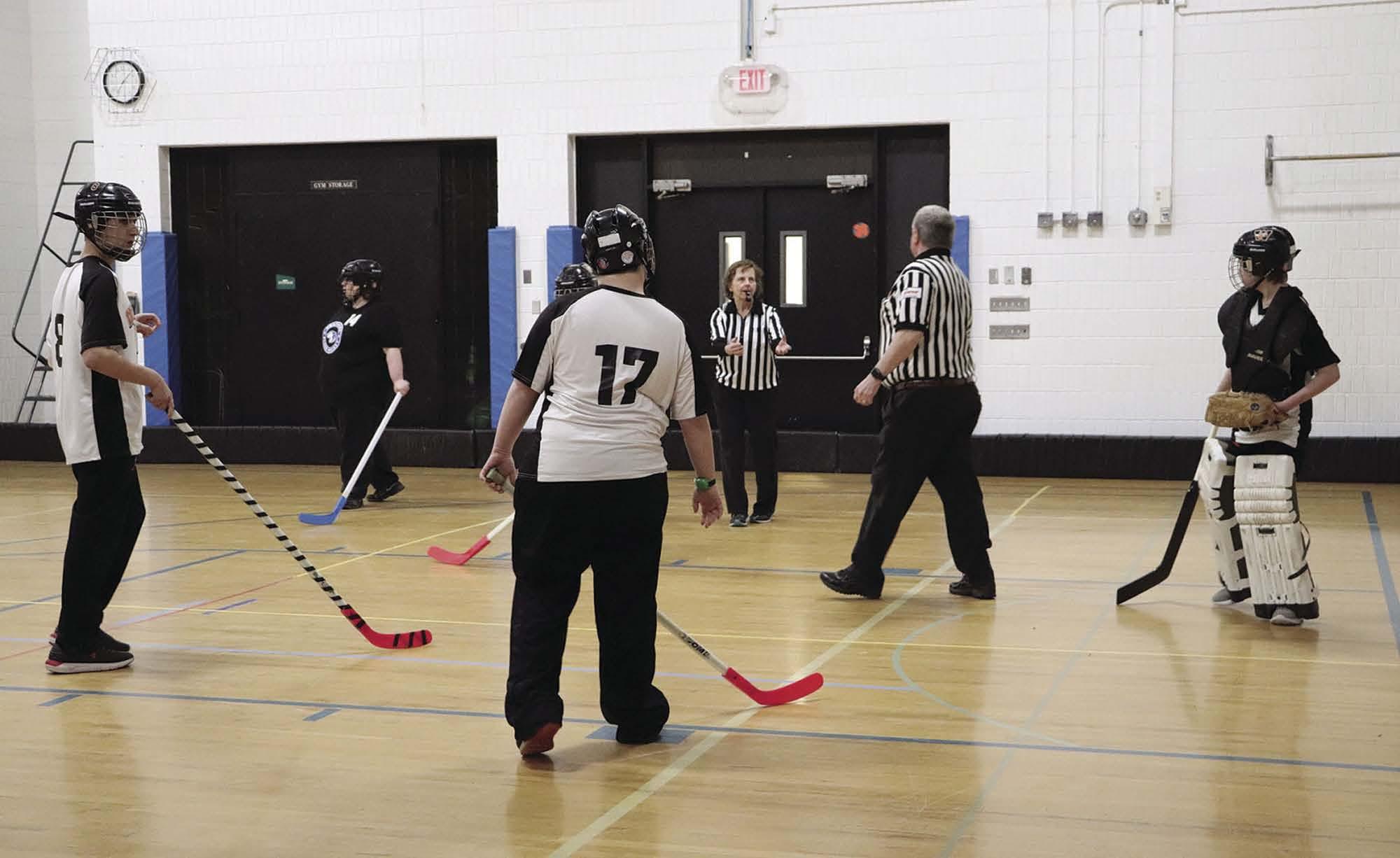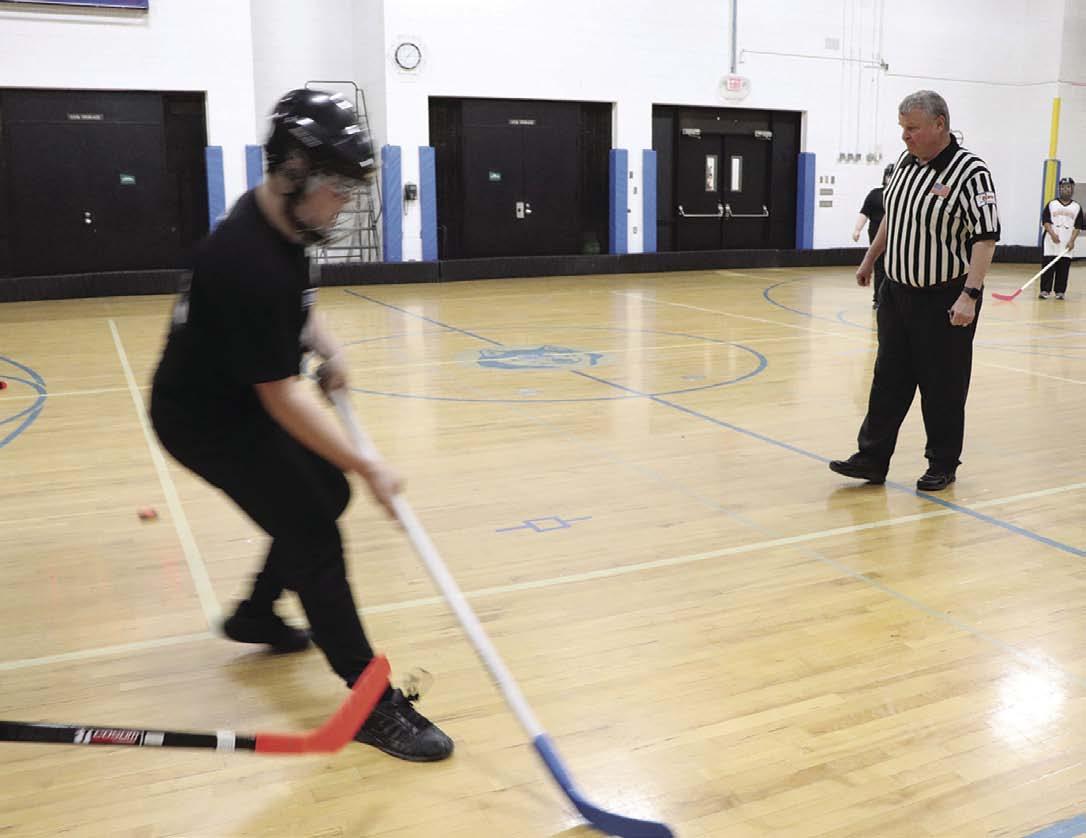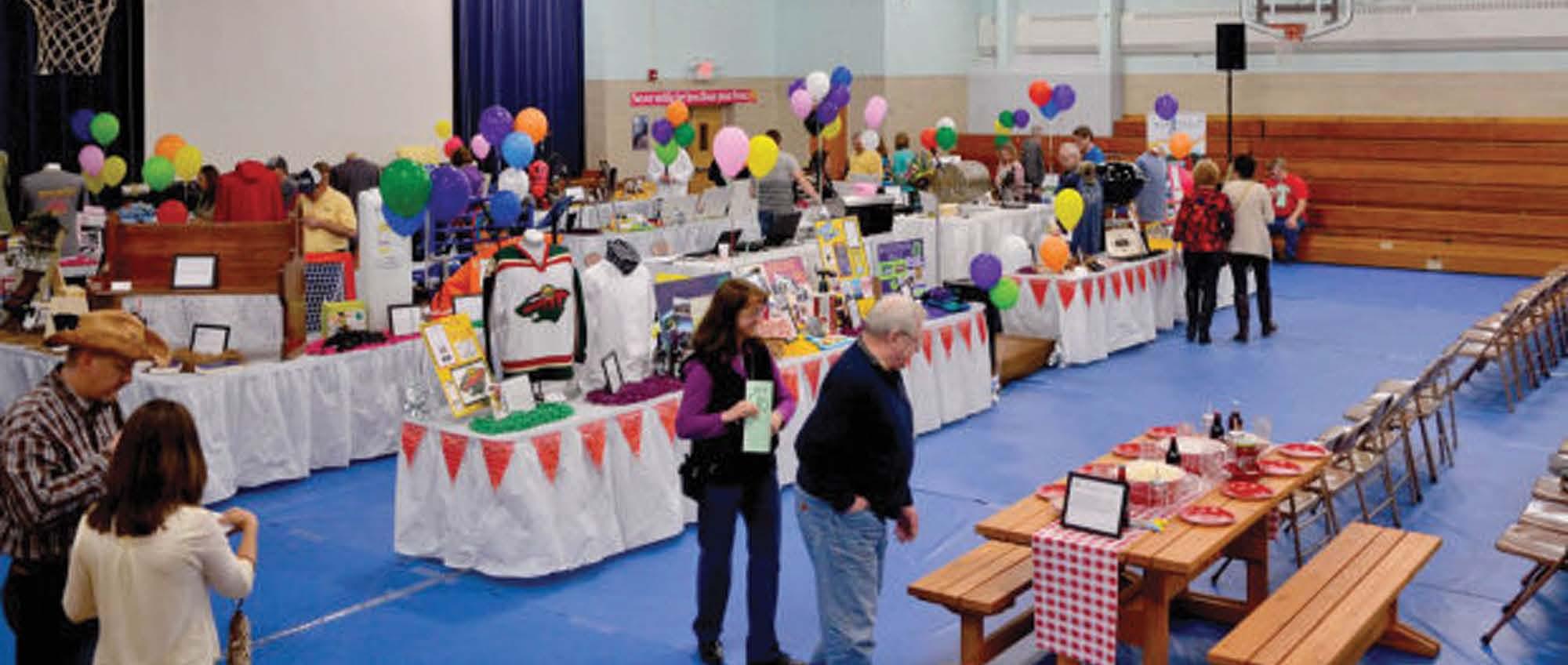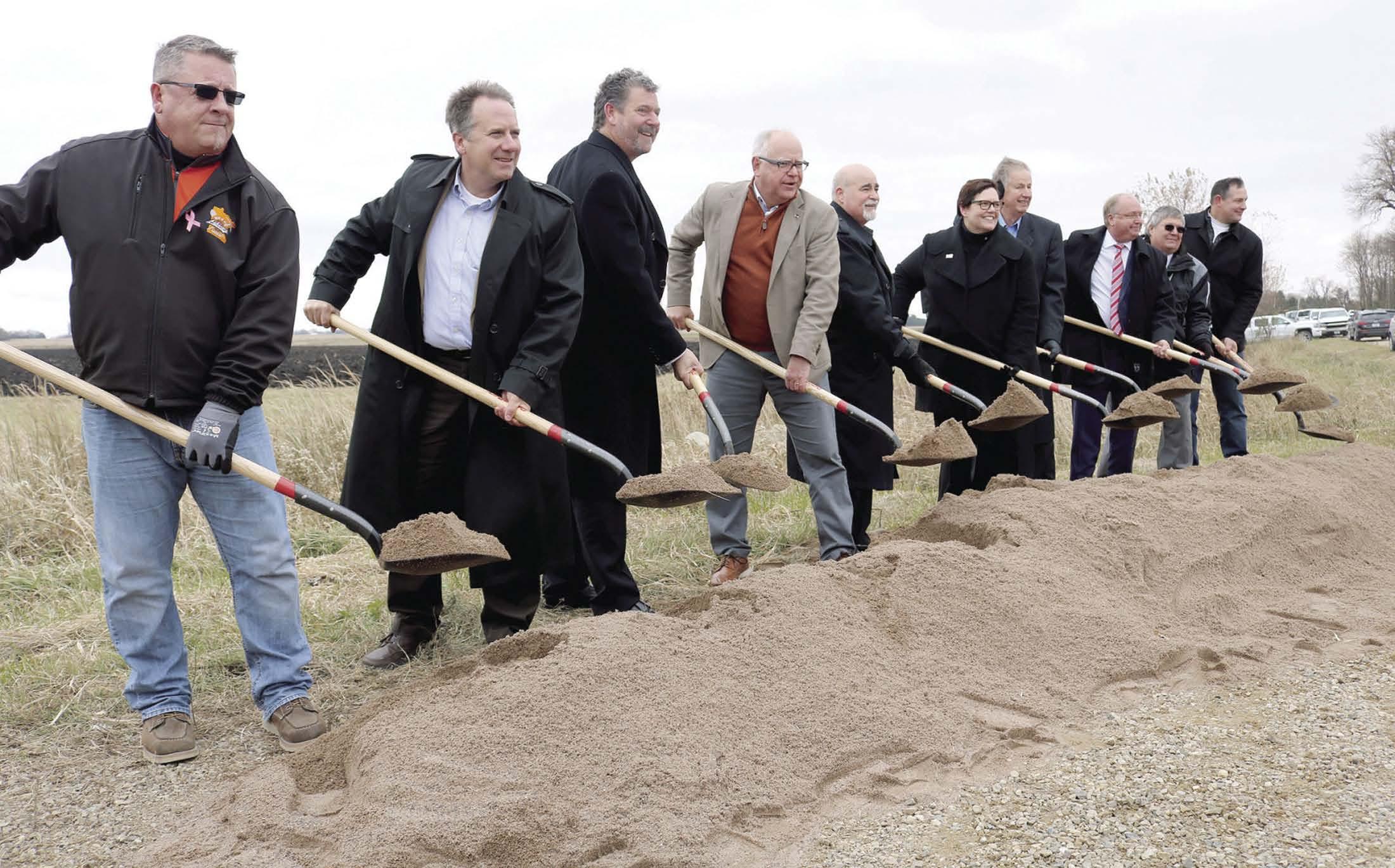
15 minute read
Getting in the game: The helpers who make athletics possible in the Owatonna Public Schools
Tedious work is put into the layout of the fairgrounds come fair week, speci cally what vendors will attend and where to place them in order to give the visitors the widest variety of food and products possible.

The devoted of ce staff — affectionately refered often as the “of ce ladies” — put in full-time work during the summer and even more during the fair week. Staffers Vickie Deml (third from left), Sharon Klein (third from right), and Rhonda Bennett (second from right), put in hours at the of ce year round. From left to right: Deb Mather, Angie Jenson, Deml, Klein, Bennett, and Denise Lage.

With more than 300,000 people attending the Steele County Free Fair each year, the economic impact it brings to the area is roughly $10 million. While the fair week is the pride and joy of Steele County, it takes an army of people working hard all year long to put together the largest county fair.
the cost to put up a fence around the entire fairgrounds would be astronomical. “And nobody wants that, not our community and not our vendors. When I talk to food vendors who have never been here before, I always tell them that there are people who come to the fair every night — some of them twice — for meals.” “We also have a lot of people who come to our fair who can afford to come from out of town because it is free,” she continued, describing the variety of people who have shared stories over the years that drive down from the Twin Cities and attend the SCFF over the State Fair because of ticket costs alone. Vendors — whether they be food or merchandise — take up a great deal of time outside of fair week as well. In January, a group of board members gathered in the Muckle Museum next to the fair of ce to stuff more than 450 envelopes that were then mailed out to vendors planning to attend the 2020 fair. The envelopes include everything that they need to know, including information on camping, parking, the rules and regulations, the re department codes, electrical codes, health department codes, animal health codes, insurance information and more. Some of the items include things that the fair of ce need back — such as the vendors insurance, sales tax forms, and licenses — which Deml says they typically have everything back by the beginning of June. “If we don’t hear from them by the middle of April we start making calls,” Deml added. “May is technically our deadline.” The mailer process is just one of many motions the of ce staff and board members goes through when it comes to vendors, though. Kozelka said that they constantly are considering the perfect equation to mix things up throughout the grounds so that fairgoers will be exposed to different products. “Every other day we are going through new vendor applications,” Kozelka said. “We need to know about their products, about their booths - Elmer (Reseland, the one-time manager of the fair) used to ask for their booth measurements to the inch from hitch to bumper — all the little things.” “We are looking at a waiting list for inside vendors,” Klein added, noting that this is the rst time that she can recall in her 19 years at the fair of ce that this event has occurred. “We get called about it every day.” Needless to say, from signing entertainment contracts to getting vendors situated to soliciting sponsorships, the of ce is the true backbone of the fair not only during fair week but during any week of the year. While Kozelka is full time, Deml and Klein say they put in 20 to 25 hours a week at the of ce during the winter, moving to full time hours in May, and working a “minimum” of 40 hours a week in August. “I enjoy working here because I get to see results that make people happy,” Deml said. “It’s fun, but we have our stress, too.” “It doesn’t matter where you go in the U.S., people know about our fair,” Klein said with pride.
“We work all the time,” laughed Kozelka as the phone rang for the fth time in less than an hour. “People are always coming into the of ce, whether it’s for information or to make a payment, and our phones are always ringing no matter what time of the year it is.”
“It’s everyone’s fair and everyone loves being a part of the fair,” he continued. “It gets in your blood and becomes your passion.”
The 2020 Steele County Free Fair is scheduled for Aug. 18 - 23.
Todd tosses the puck to wife Connie at an adapted oor hockey game. While of ciating, the pair noted that they focus on player safety and communicating constantly with one another. “Whoever is dropping that puck, we’re making sure that we’re looking at the other one. We do a lot of head nods,” explained Connie. She and Todd have been married for 37 years. (Bridget Kranz/People’s Press)

In most cases, ticket sellers are set up at the entrance. Seated close to the action are announcers, scorekeepers and those responsible for running the clock. In some cases, even the of cials are area residents who’ve come over straight from work to get the game started.
For adapted oor hockey, these local referees are Connie and Todd Schelling, who’ve been presiding over the court at Owatonna Middle School for years.
“I’ve been of ciating lacrosse and oor hockey for about 15 years,” recalled Todd. “I started when Owatonna was a club team in lacrosse and then got into doing adapted oor hockey with several different partners. About ve years ago, Connie got certi ed and has been doing it with me ever since.” After 37 years of marriage, he added that they’ve become pretty dialed in and communicate across the oor with non-verbal signals. Connie joked that it’s a lot of head nods or shakes, and that whoever is dropping the puck is always making eye contact to see where their partner is at. In order to of ciate the sport year to year, the Schellings have to take an annual test and are also expected to know all of the rules of ice hockey — which Todd said had a bit of a learning curve for someone who’d never played the sport. When it comes to getting to the 4:30 p.m. games on time, Connie added that both of their daytime employers help make it possible and — despite the occasional double shifts — seeing the players always makes for a rewarding evening. “You can have a really crazy, mixed-up day and rush out of here to get there on time, and you see the kids and they’re all smiling at you and it just makes it worthwhile. It’s a good feeling,” she explained. Announcing ... on ice At the same time that the Schellings are heading over to the middle school for adapted oor hockey, fellow game helper Tony Schwichtenberg is often on his way to the rink to get ready for ice hockey. Schwichtenberg serves as the in-arena announcer for boys and girls home events, warming up with the JV match up and then staying on to present the starting line-ups and call the goals for each varsity game. “I’m pretty much in game mode until 9 p.m., except for intermissions and things like that. Then I’m usually taking notes or writing the starting line-ups or getting stuff prepared,” he explained. “I’ve got it down to about half an hour of prep time for a game, and I try to do it either the night before or early that morning. I have a day job and I don’t want to wait until 4 p.m. and then get a phone call and be trying to do two things at once.” A lot of the preparation for Schwichtenberg involves getting his game script in order. This includes pre-game announcements, starting line-ups and information about upcoming matches, among other things. During play, he’s responsible for letting the audience know which player scored when there’s a goal, information he gets in the box from of cials as they skate by. Because he’s worked games now for roughly a decade, starting with scoring and then moving in to announcing a few years later,
“Nobody can run a meet like she can. She can make a ve-hour junior high meet take three hours,” laughed Jeff.
Sandy added that older students will often help run the middle school meets. Additionally, when she and Jeff work the scoring table for basketball games, junior and varsity players will do the work for the B-squad game.
“That’s a good experience for them, and that’s a skill. When you go to college, you need a job. I always tell the gymnasts to take the test and get some judging jobs,” added Sandy, “and we talk to them if they have questions.”

In helping start up the gymnastics program 50 years ago, Sandy added she and her team had also needed help learning how to run competitions.
“No one knew how to of ciate gymnastics, so I had four people that I trained in and taught them how to judge two events each so we could have our gymnastics meets at home,” she recalled. “The colleges were really good about providing opportunities for us to learn more about athletics and how to operate athletics and how to coach.”
Sandy noted that universities helping get girls’ high school athletics off the ground was a win-win, creating a better recruiting pool at the college level, as well. Today, she added that additional responsibilities have necessitated more people working each game.
“I used to do it all — I’d do the scorebook, the clock and the announcing. Now we have a new scoreboard where we put up the statistics, like the aces and kills in volleyball. Then, they started the libero — that’s a back row player that has to be tracked when they go in and out,” she explained. “Now, there are three of us that sit at the table, and I just do the scorebook and the announcing.”
‘It’s something I missed being around’
One of Sandy’s newer helpers is Amy Mundale, who has taken over the role of keeping tabs on the libero at home games. Unlike many parents, who Sandy said volunteer often when their children are in sports but don’t always stay on after graduation, Mundale got started after her own kids had left the district. Todd Schelling keeps his eye on the puck at a recent adapted oor hockey game at Owatonna Middle School. Both Todd and his wife, Connie, have been of ciating the team’s home games for years. After leaving work to get over to the 4:30 p.m. match-ups, Connie noted that the players’ greetings and enthusiasm for the game always make refereeing a nice way to spend an hour. (People’s Press le photo)
Schwichtenberg had a similar story for how he initially got involved — in both cases, their kids had left the house and they had more free time. For Mundale, she said she also missed being around the school and attending home games, something she had done frequently when her own kids were in sports.
“I missed going to all the events, and having those relationships with parents and coaches,” she explained. “I was an athlete when I was in high school, my kids were involved in sports,and it’s something I missed being around.”
As a graduate of Owatonna High School, Mundale added that it can be fun catching up with former classmates at the games, in addition to welcoming visitors who have never been to town before. She added that she’s even gotten some friends to start helping out with her at events — especially selling tickets at football games, where there are usually a couple people working each table.
When she’s working admission, Mundale said she typically arrives an hour beforehand because that’s when attendees start showing up. When she’s helping with volleyball, or running the triple jump at track meets, she added that there will often be a meeting with referees before the game to get everyone on the same page.
“Everybody has a different way of doing things,” she explained.
For the Schellings, they said they’ll also meet with students before the game to go over safety precautions, with concussions being one of the primary focuses. “With all sports, there’s a focus on any contact above the shoulders,” noted Todd. “That’s one of the biggest things we look out for, making sure everybody’s playing safe.”
Once everything is in place, the Schellings drop the puck, Schwichtenberg announces the starting line-up, Von Ruden takes up his position along the sidelines, Mundale keeps her eye on the libero and the Bosses get ready to host as ef cient a track or crosscountry meet as possible — doing it all, everyone explained, for the love of the game.
“They know that we’ve got our stuff together. They just do the signals, y by the box and give us whatever the call is,” he explained.
With so much going on, including not only announcing but also queuing up music and updating live scoring for those following along online, he added that the helpers working in the box don’t actually watch much of the game.
Although he said he’s gotten used to it now, when he was rst starting out he recalled a vivid nightmare where he couldn’t nd the right CD — when the players took the ice for the lineup, the lights went down and he had no music or script. Shortly after starting, Von Ruden was also able to get his two brothers involved. While his siblings left the game in the early 2000s, he added that now his nephew has taken their place — making the chain gang a family affair.
“My brothers and I always just enjoyed being there. To us, it was the best seat in the stadium. We were right there. You hear a lot, you see a lot. You’re right there in the action,” he explained. “Although, I’ve always trained whoever comes on that we as the chain gang are a part of the of cials. We can’t sit there and cheer on the home team.”
Another occasional requirement of working the sideline is quick feet, as Von Ruden said he and his crew will often have to hustle down to the other end of the eld when a team makes a long play.
“Now I still get energized, but I’d say it’s not as nerve-wracking,” he laughed.
In addition to himself, Schwichtenberg estimated that there are roughly a dozen adults total assisting at any given game.
“I’d say hockey is right in the middle, and I’d say basketball is pretty similar — I ll in there once in a while,” he added. “Football is the big one because you have multiple people in the press box, a clock operator, announcer, spotter, multiple ticket gates with two people each, three site managers. And football is in the spotlight, too — everybody goes to football games.”
Sixty years on the sidelines
Despite the crowd, longtime football volunteer Fred Von Ruden said he always gets the best seat in the house. The Owatonna High School alum has been helping out at games for nearly 60 years, coming right back onto the eld as a volunteer only a few years after graduating in 1956.
“I enjoyed going up there and giving back to the school,” he explained. “I was in three different sports when I was in high school. I was in football, wrestling and baseball.” “We get a good workout every once in a while,” he laughed. “If they take these long runs, we’ve got to hurry up and get down to the other end.”
He jokes that this is maybe one of the reasons the process had stayed pretty much the same since he started working on the chain gang all those years ago.
“It’s something that they haven’t been able to automate yet — unless they get robots going down the eld! And that might take a little while,” he joked.
For now, Von Ruden plans on returning next fall. “All these years, I’ve really enjoyed it and hopefully I have some more years yet,” he explained.
Like Von Ruden, Jeff and Sandy Boss have also been around the district for decades — the pair started teaching in 1968 and 1969, respectively. Now, Sandy continues to help out with many of the sports that she helped launch for girls in the district following the passage of Title IX.
Von Ruden added that he initially started helping out at games working the clock at wrestling matches in 1959, a couple years later then-Athletic Director Earl Bruhn put him on the football team’s chain gang. For the nearly six decades since, Von Ruden has been helping mark rst downs, holding up the posts and running the 10-yard chain up and down the eld to help players and of cials know where the ball needs to get. “I was hired to be a gymnastics coach, and that was really the rst girls sport. But right away we started some wheels turning and got more going,” she explained. “I also coached track, and actually the rst state meet was in 1972 — that was the rst state tournament for girls in track and eld.” Although Sandy retired from coaching and from her career as a middle school physical education teacher more than a decade ago, she continues to help with volleyball,
Fred Von Ruden has been part of the chain gang at Owatonna High School football games for nearly 60 years. Initially marking downs with his two brothers, Von Ruden has more recently worked the sidelines with his nephew. Before graduating from OHS in 1956, Von Ruden was a three-sport athlete, competing in football, wrestling and baseball. On his reason for coming back to help out with games, he explained, “I enjoyed going up there and giving back to the school.” (Bridget Kranz/People’s Press)

Welcome To fresh •Fresh Produce •Deli •Meat & Seafood. •Bakery •Dairy Frozen •Pharmacy •Floral •Liquor •Friendly Staff.















